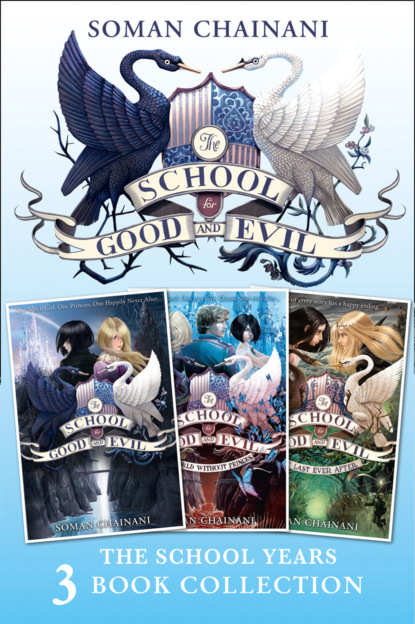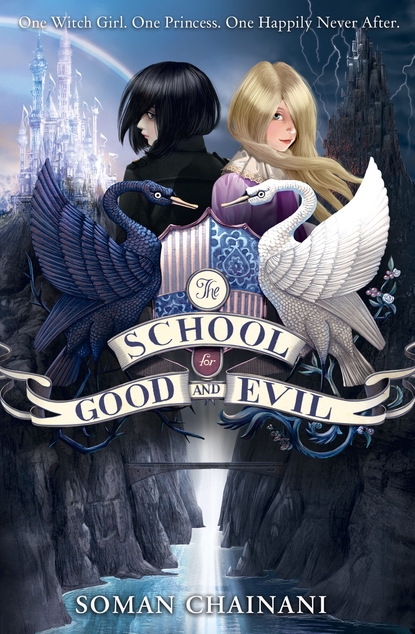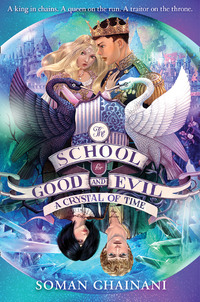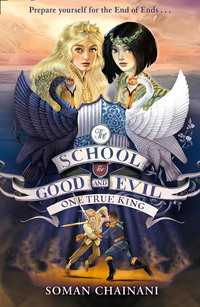
Полная версия
The School for Good and Evil: The Complete 6-book Collection
Sophie turned. “Um, what would a dream like that mean?”
“That you are a special girl, Sophie,” Lady Lesso cooed. “One we should all be proud of.”
“Oh. Um . . . I may have had one or two—”
“Nemesis Dreams,” Lady Lesso said, violet eyes flashing. “You’re having Nemesis Dreams.”
Sophie stared at her. “But—but—”
“Nothing to be concerned about, dear. Not until there’s symptoms.”
“Symptoms? What symptoms? What happens if there’s symptoms?”
“Then you’ll finally see the face of your Nemesis. The one who grows stronger as you grow weaker,” Lady Lesso answered calmly. “The one you must destroy in order to live.”
Sophie blanched. “B-b-but that’s impossible!”
“Is it? I think it’s quite clear who your Nemesis is.”
“What? I don’t have anyone that—”
Sophie lost her breath.
“Tedros? But I love him! That’s why I did it! I have to get him back—”
Lady Lesso just smiled.
“I was angry!” Sophie cried. “I didn’t mean any—I don’t want to hurt him! I don’t want to hurt anyone! I’m not a villain!”
“You see, it doesn’t matter what we are, Sophie.”
Lady Lesso leaned so close she just had to whisper.
“It’s what we do.”
Her pupils flicked over Sophie’s face. “But no symptoms yet, I’m afraid,” she sighed and swept to her desk. “Close the door on your way out.”
Sophie fled too fast to bother.
That night, Sophie didn’t attack the Evers.
Let him go, she told herself, pillow over her head. Let Tedros go.
Over and over she repeated it, until she had erased the meeting with Lady Lesso from her memory. As the words soothed her to sleep, she felt the stirrings of her old self. Tomorrow she’d be loving. Tomorrow she’d be forgiving. Tomorrow she’d be Good again.
But then another dream came.
She ran through mirrors reflecting her smiling face, long gold hair, and luscious pink gown. Through the last mirror was an open door and through the door, Tedros waited for her, kingly in his blue Ball suit beneath Camelot’s spires. She ran and ran to him but grew no closer, until deadly sharp briars, swollen purple, began to snake towards her true love. Frantic, she willed herself through the last door to save him, losing a glass heel and lunged for his arms . . . The prince melted to a milky, red blur and threw her into thorns.
Sophie woke enraged and forgot all about letting go.
“It’s the middle of the night! You said it was over!” Anadil fumed, following her into the tunnel—
“We can’t keep doing these things without a purpose,” Hester seethed.
“I have a purpose,” Sophie said, whirling around. “You hear me? I have a purpose.”
The next day, the Evers arrived at lunch to find all the trees on their side cut down. All except the one Sophie and Tedros used to sit beneath, carved again and again with one unmistakable word.
LIAR.
Stunned, the wolves and nymphs howled for the teachers and immediately formed a boundary between the two halves of the Clearing. Tedros stormed up to the border between two wolves.
“Stop it. Now.”
Everyone followed his eyes to Sophie, sitting serenely against a snowy tree on the Nevers’ side.
“Or what?” she simpered. “You’ll catch me?”
“Now you really sound like a villain,” Tedros sneered.
“Careful, Teddy. What will they say when we dance at the Ball?”
“All right, now you’ve lost it—”
“Here I thought you were a prince,” Sophie said, walking towards him. “Because you promised to take me to the Ball right in this very spot. And a prince never breaks his promise.”
Gasps rose from both sides of the Clearing. Tedros looked like he’d been kicked in the gut.
“After all, a prince who breaks his promise”—Sophie faced him between two wolves—“is a villain.”
Tedros couldn’t speak, cheeks splotched red.
“But you’re not a villain and neither am I,” Sophie said, eyes guilty. “So all you have to do is keep your promise and we can be ourselves again. Tedros and Sophie. Prince and princess.”
With a tentative smile, she held out her hand across the wolves to him.
“Good for Ever After.”
The Clearing was dead silent.
“I’ll never take you to the Ball,” Tedros spat. “Never.”
Sophie withdrew her hand.
“Well, then,” she said softly. “Now everyone knows who’s responsible for the attacks.”
Tedros felt Evers’ blameful stares burning through him. Ashamed, he trudged out of the Clearing, as Sophie watched, heart in her throat, fighting the urge to call him back.
“This is about a Ball?” said a voice.
Sophie turned to glowering Hester and Anadil.
“This is about what’s right,” she said.
“You’re on your own,” Hester snarled, and Anadil followed her away.
Sophie stood, circled by stunned students, teachers, wolves, and fairies, listening to her own shallow breaths. Slowly she looked up.
Tedros glared down at her from inside the glass castle. In the weak sun, his milky face had a glint of red.
Sophie met his eyes, steeling her heart.
He’d love her back. He’d have to.
Because she’d destroy him if he dared love anyone else.


GET YOUR OWN LIFE.
What life? Before Sophie, all she could remember was darkness and pain. Sophie had made her feel normal. Sophie had made her feel needed. Without Sophie, she was a freak, a nothing, a . . .
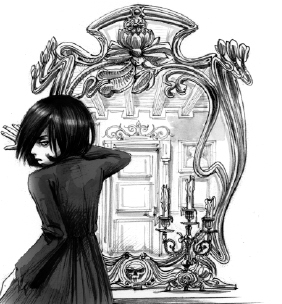
Agatha’s stomach dropped.
A witch never has her own fairy tale.
Without Sophie, she was a witch.
For six days, Agatha stayed shut up in her tower, listening to the screams of Evers terrorized by new attacks. All joint-school activities had been canceled indefinitely, lunch and Forest Groups included. Was this all her fault? Didn’t witches leave fairy tales in ruins? As the screams outside grew more panicked, her guilt screwed tighter and tighter.
Then the attacks stopped.
Huddled in common rooms, Evers held their breath. But when Saturday and Sunday went, Agatha knew the storm had passed. Sophie would come to say sorry any minute now. Gazing at the rose-tinted moon, Agatha hugged her pillow and prayed. Their friendship would survive this.
Fairies jingled outside the door and she swiveled to see a note slid under it. Chest pounding, she dived out of bed, swooped it into sweaty palms—
Dear Students,
With the Snow Ball six days away, this week’s challenges will see if you are prepared. Despite recent interruptions, there will be no further cancellations. Our traditions are what separate Good from Evil. Even in the darkest of times, a Ball may be your best chance to find a happy ending.
Professor Dovey
Agatha groaned and buried herself under pink sheets.
But as she gave in to sleep, she began to hear words . . . Ball . . . purpose . . . happy . . . They tumbled in darkness, echoing deeper, deeper, until they planted in her soul like magic seeds.
Ravan tiptoed towards Room 66, swan crests of six shivering Nevers glinting in darkness behind him.
“If the attacks stopped, maybe she’s dead,” Vex said.
“Maybe villains don’t do Evil on Sundays,” said Brone.
“Or maybe Sophie got over that stupid prince!” Ravan lashed.
“You don’t ever get over love,” Hort moped in dirty long johns. “Even if they steal your room and your pajamas.”
“Sophie shouldn’t even have let herself love!” Ravan shot back. “First time I told my dad I liked a girl, he slathered me in honey and sealed me in a bear den for a night. Haven’t liked one since.”
“First time I told my mother I fancied someone, she baked me in an oven for an hour,” Mona agreed, green skin paling. “I never think about boys now.”
“First time I liked a boy, my dad killed him.”
The group stopped and stared at Arachne. “Maybe Sophie just had bad parents,” she said.
With solemn nods, the Nevers skulked to Room 66, hidden in shadow. Holding their breaths, they each found a piece of door and pressed their ears to it.
They didn’t hear anything.
“On three,” Ravan mouthed. Nevers backed up, preparing to storm it. “One . . . two . . .”
“Drink this.”
Anadil’s voice inside. Nevers shoved their ears to the door.
“They’re—killing—me—” Sophie rasped weakly—
Sounds of vomiting.
“She has a high fever, Hester.”
“Lady Lesso said—Nemesis—Drea—”
“They’re nothing, Sophie,” Hester’s voice said. “Now go to sleep.”
“Will I—be—better for—Ball? Tedros—promised—”
“Close your eyes, dearie.”
“Dreams—they’ll come—” Sophie wheezed—
“Shhh, we’re here now,” Hester said.
It was quiet inside, but Ravan and the Nevers didn’t move. Then they heard voices closer to the door.
“Dreams of faces, high fever, obsession . . . Lady Lesso’s right!” Anadil whispered. “Tedros is her Nemesis!”
“So she did meet the School Master!” Hester whispered back. “She’s in a real fairy tale!”
“Then this whole school better watch out, Hester. Real fairy tales mean war!”
“Ani, we need to get Tedros and Sophie back together now! Before any symptoms appear!”
“But how?”
“Your talent,” Hester whispered. “But we can’t tell a soul! This gets out and all our lives are at stak—”
Her voice stopped.
Ravan wheeled to the others—
The door slammed open. Hester peered out, eyes narrowed.
But the hallway was empty.
On Monday morning, Agatha woke with a strong urge to go to class.
Stomping around her room, she shoved on her rumpled pinafore and picked lint from her greasy hair. How many days could she wait? Sophie didn’t want to apologize? Sophie didn’t want to be friends? She crushed Sophie’s paper rose, hurled it through the window—
I can have my own life!
She searched for something else to throw, then glimpsed crinkled parchment under her toes.
“A Ball may be your best chance . . .”
Agatha grabbed it into her hands and read Professor Dovey’s note again, eyes flaring.
That’s it! The Ball was her chance!
All she needed was one of those vile, arrogant boys to take her! Then Sophie would eat her words!
She jammed callused feet into her clumps and stomped down the stairs, waking the whole tower.
She had five days to find a date to the Evers Snow Ball.
Five days to prove she wasn’t a witch.
Ball Week got off to a bizarre start when Professor Anemone pranced in ten minutes late, wearing a white swan-feather dress with a high rump and scandalously short hem, along with purple panty hose, sparkly garters, and a crown that could have been an upside-down chandelier.
“Behold, true Ball elegance,” she preened, caressing her tail feathers. “A good thing boys cannot ask me to the Ball, or many of you would lose your princes!”
She basked in her students’ stares. “Yes, isn’t it divine. I was told by Empress Vaisilla this is all the rage in Putsi.”
“Putsi? Where is Putsi?” Kiko wisped.
“Home to a lot of angry swans,” said Beatrix.
Agatha gouged herself with a pen to not laugh.
“Because your suitors have chosen to wait until the Circus to propose, I caution you to take this week’s challenges seriously,” Professor Anemone huffed. “An exceptionally good or poor performance could very well change a boy’s mind!”
“Suppose Tedros did promise to take Sophie to the Ball?” Reena whispered to Beatrix. “Princes can’t break promises without something terrible happening!”
“Some promises are meant to be broken,” Beatrix retorted. “But if anyone tries to ruin my night with Tedros, I promise they won’t survive the night.”
“Of course not all of you will be asked to the Snow Ball,” warned Professor Anemone. “Every year, one woeful girl is failed, because boys would rather take half ranks than take her. And such a girl who can’t find a boy, even under the most propitious circumstances . . . well, she must be a witch, musn’t she?”
Agatha felt everyone’s eyes on her. Failed if a boy didn’t ask her?
Now finding a date was a matter of life and death.
“For today’s challenge, you must try to see who your date for the Ball will be!” her teacher declared. “Only when you see a boy’s face clearly in your head will you know he wants you too. Now join the person beside you and take turns proposing. When it is your turn to accept, close your eyes and see whose face appears. . . .”
Agatha turned to Millicent across her desk, who looked poised to vomit.
“Dear, um, Agatha . . . willyoubemyprincessfortheBall?” she heaved, then retched so loud Agatha jumped.
Oh, who was she kidding? She looked down at her bony limbs, pasty skin, and nails bitten to the nub. What boy would choose to ask her to the Ball! As hope seeped out of her, she glanced at girls, eyes closed in euphoria, dreaming of their princes’ faces—
“It’s a yes-or-no question,” Millicent moaned.
With a sigh, Agatha closed her eyes and tried to imagine her prince’s face. But all she could hear were the loud echoes of boys fighting to not be her date. . . .
“There’s no one left for you, dear.”
“But I thought every boy had to go, Professor Dovey—”
“Well, the last one killed himself rather than take you.”
Phantom laughter shrieked in her ears. Agatha gritted her teeth.
I’m not a witch.
The boys’ voices softened.
I’m not a witch.
The voices receded into darkness. . . .
But there was nothing in their place. Nothing to believe in.
I’m not! I’m not a witch!
Nothing.
Something.
A milky, faceless silhouette born out of darkness.
He bent before her on one knee . . . took her hand . . .
“Are you feeling all right?”
She opened her eyes. Professor Anemone was staring at her. So was the rest of the class.
“Um, I think so?”
“But you . . . you . . . smiled! A real smile!”
Agatha gulped. “I did?”
“Have you been bewitched?” her teacher shrieked. “Is this one of the Nevers’ attacks—”
“No—I mean—it was an accident—”
“But, my dear! It was beautiful!”
Agatha thought she might float out of her chair. She wasn’t a witch! She wasn’t a freak! She felt her smile return, bigger, brighter than before.
“If only the rest was too,” Professor Anemone sighed.
Agatha’s smile collapsed into its comfortable frown.
Dispirited, she flopped her next two challenges miserably, with Pollux calling her attitude “nefarious” and Uma sighing she’d seen sloths with more charm.
Sulking in the pews before History, Agatha wondered whether Professor Sader could, in fact, see her future. Would she find a date to the Snow Ball? Or was Sophie right about her being a witch? Would she fail and die here all alone?
The problem was there was no way to ask Sader anything, even if he was a seer. Besides, to broach the subject, she’d have to admit she broke into his study. Not the best way to win a teacher’s confidence.
In the end, it didn’t matter because Sader never showed up. He had chosen to spend the week teaching at the School for Evil, claiming that History couldn’t compete with the distractions of a Ball. In his absence, he relinquished the teaching of “Ball Customs & Traditions” to a gang of unkempt middle-aged sisters in musty gowns. The Twelve Dancing Princesses from the famous fairy tale who had each won their prince at a court Ball. But before they could reveal how exactly they squired these princes, the twelve shrews started bickering as to the correct version of their story, then shouting over each other.
Agatha closed her eyes to tune them out. No matter what Professor Anemone said, she had seen someone’s face. Blurry, foggy . . . but real. Someone who wanted to ask her to the Ball.
She clenched her jaw.
I’m not a witch.
Slowly the silhouette appeared out of darkness, this time closer, clearer than before. He took one knee before her, lifted his face into light . . .
A screech jolted her awake.
Onstage, the twelve sisters were bellowing and butting each other like gorillas.
“How can those be princesses?” Beatrix cried.
“That’s what happens after you’re married,” said Giselle. “My mother stopped shaving her legs.”
“Mine can’t fit in any of her old gowns,” Millicent said.
“Mine doesn’t wear makeup,” said Ava.
“Mine eats cheese,” Reena sighed. Beatrix looked faint.
“Well, my wife tries any of that, she can go live with witches,” Chaddick said, gnawing on a turkey leg. “In all those pictures of Ever After, no one sees an ugly princess.”
He noticed Agatha sitting stiffly next to him. “Oh. No offense.”
By lunch, Agatha had forgotten all about finding a date and wanted to go groveling back to Sophie. But she, Hester, and Anadil were nowhere to be found (or Dot, for that matter) and the Nevers seemed curiously subdued on their side of the Clearing. Meanwhile, she could hear Evergirls chuckling as Chaddick retold his story to different groups, the “No offense” line sounding more offensive each time. Even worse, Tedros kept giving her strange looks between horseshoe throws (and an especially strange one after she dropped her bowl of beet stew all over her lap).
Kiko plopped down beside her. “Don’t be upset. It can’t be true.”
“What?”
“The two boys thing.”
“What ‘two boys’ thing?”
“You know, that they all made a pact for two boys to go together rather than ask you.”
Agatha stared at her.
“Oh no!” Kiko squeaked, and fled.
In Good Deeds, Professor Dovey gave them a written test on how they would handle moral predicaments at a Ball. For instance:
1. If you attend the Ball with someone other than your first choice, but your first choice, who you’re madly in love with, asks you to dance, do you:
A) Kindly inform them that if they wanted to dance with you they should have asked you to the Ball
B) Dance with them, but only to a fast-paced rondel
C) Ditch your date for your first choice
D) Ask your date what they would feel comfortable with
Agatha answered D. Underneath it, she wrote:
“Unless no one would ever ask you to a Ball, let alone to dance. Then this question doesn’t apply.”
2. Upon arriving at the Ball, you notice your friend’s breath smells unbearably of garlic and trout. However, your friend is going with the person you hoped would ask you to the Ball. Do you:
A) Inform your friend at once of their foul odor
B) Say nothing since it is your friend’s fault they smell
C) Say nothing because you will enjoy watching them be embarrassed
D) Offer them a piece of sweet licorice without mentioning their breath
Agatha answered A. She added, “Because at least bad breath is temporary. Ugly is forever.”
3. A baby dove with a broken wing slips into the Good Hall, crashes to the dance floor during the last waltz, and is in severe danger of being crushed. Do you:
A) Scream and stop the dance
B) Finish the dance and then attend to the dove
C) Kick the dove off the floor while dancing so it’s safe, then attend to it after
D) Abandon the dance and rescue the dove, even if it means embarrassing your partner
Agatha answered D. “My partner is imaginary. I’m sure he won’t mind.”
She answered the next 27 questions in the same spirit.
Perched at her desk made out of sugarplums, Professor Dovey scored the tests and shoved them under a gleaming pumpkin weight, face growing grimmer and grimmer.
“Just what I’ve been afraid of,” she fumed, flinging the tests back to the students. “Your answers are vain, vacuous, and at times downright villainous! No wonder that Sophie girl made fools of you all!”
“Attacks are over, aren’t they?” Tedros muttered.
“No thanks to you!” Professor Dovey barked, thrusting a red-drenched test at him. “A Never wins a Trial, lays waste to our school—and no Ever to catch her? No one Good to put down a student?”
She slung tests across a row. “Must I remind you that the Circus of Talents is in four days? And that whoever wins the Circus has the Theater of Tales moved to their school? Do you want your Theater moved to Evil? Do you want to walk with shame to Evil for the rest of the year?”
No one could meet her eyes.
“To be Good you must prove yourself Good, Evers,” Professor Dovey warned. “Defend. Forgive. Help. Give. Love. Those are our rules. But it is your choice to follow them.”
As she went over the tests, excoriating every wrong answer, Agatha shoved hers away. But then she noticed the corner:
100%
SEE ME.
When the fairies chimed the end of class, Professor Dovey shooed all the Evers out, closed the pumpkin candy door, and locked it. She turned and found Agatha atop her desk, eating a sugarplum.
“So if I follow the rules,” Agatha said, chomping loudly, “I’m not a witch.”
Professor Dovey eyed the new hole in her desk. “Only a truly Good soul lives those rules, yes.”
“What if my face is Evil?” Agatha said.
“Oh, Agatha, don’t be ridic—”
“What if my face is Evil?”
Her teacher flinched at her tone.
“I’m far from home, I’ve lost my only friend, everyone here hates me, and all I want is a way to find some kind of happy ending,” Agatha said, red-hot. “But you can’t even tell me the truth. My ending is not about what Good I do or what’s inside me. It’s about how I look.” Spit flew out of her mouth.
“I never even had a chance.”
For a long moment, Professor Dovey just gazed at the door. Then she sat down on the desk next to Agatha, broke off a sugarplum, and bit into it with a juicy squirt.
“What did you think of Beatrix the first time you saw her?”
Agatha stared at the candy plum in her teacher’s hand.
“Agatha?”
“I don’t know. She was beautiful,” Agatha groused, remembering their fart-filled introduction.
“And now?”
“She’s revolting.”
“Has she gotten less pretty?”
“No, but—”
“So is she beautiful or not?”
“Yes, at first sight—”
“So beauty only lasts a glance?”
“Not if you’re a Good person—”
“So it’s being Good that matters? I thought you said it was looks.”
Agatha opened her mouth. Nothing came out.
“Beauty can only fight truth so long, Agatha. You and Beatrix share more in common than you think.”
“Great. I can be her animal slave,” Agatha said, and bit into her plum.
Professor Dovey stood up. “Agatha, what do you see when you look in the mirror?”
“I don’t look in mirrors.”
“Why is that?”
“Because horses and hogs don’t sit around ogling their reflections!”
“What is it you’re afraid you’ll see?” Professor Dovey said, leaning near the pumpkin candy door.
“I’m not afraid of mirrors,” Agatha snorted.
“Then look in this one.”
She glanced up and saw the door near Professor Dovey was now a smooth, polished mirror.
She turned away. “Cute trick. That one in our book?”
“Look in the mirror, Agatha,” Professor Dovey said calmly.
“This is stupid.” Agatha leapt off the desk and tramped past her, head down to avoid her reflection. She couldn’t find a doorknob—



